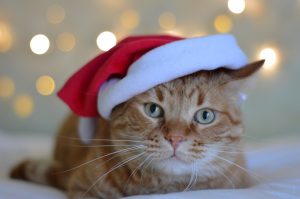December 19th, 2018

In the midst of all the holiday celebrations, DACC would like to offer pet owners a few helpful tips to keep our furry friends safe. We can get so caught up with all of the holiday festivities, it is easy to forget about our four-legged family members. Our pets rely on us to keep them safe, so keep these important things in mind as you celebrate the holidays.
- Never feed or allow your pets to eat chocolate or other holiday candies. Chocolate can be toxic to dogs and cats and can cause death. If you witness or suspect your pet of eating chocolate, take him or her to a veterinarian without delay.
- Shiny ornaments on Christmas trees can be particularly attractive to curious pets. Dogs and cats can suffer serious injuries by chewing and swallowing pieces of tree ornaments.
- Many people add special liquid preservatives to the water in Christmas tree stands. Some of these products are harmful to pets that may drink from the water. Be sure to ask if your Christmas tree supplies are “pet safe,” before you buy them.
- Keep holiday season plants and flowers away from your pets. Many plants, such as Poinsettias, Christmas Candles, English Holly, Christmas Berry, Christmas Rose, and Mistletoe are poisonous to cats and dogs.
- Gift-wrappings can pose risks to dogs and cats. Your pets may be tempted to chew on wrapping paper or ribbon, which can be harmful if swallowed.
- Electrical wiring is tempting for cats to play with and dogs to chew. Your pet can suffer a severe shock or even be electrocuted by coming into contact with the electrical current in the line. Make sure your pets cannot climb onto areas that put wiring within their reach.
- Turkey is a particular favorite during the holiday season, but the bones easily splinter and should not be given to pets. Bone splinters can puncture an animal’s gastro-intestinal tract, causing internal injury, which could result in death.
- Keep your pets away from alcoholic beverages. Do not let anyone offer a “sample” of your favorite libation to a pet.
- It is important to immediately clean up any loose tinsel, which can also obstruct a pet’s GI tract. Cats can be particularly enchanted with tinsel, so you may wish to skip this decoration. When decorating, hang tinsel and string lights high enough out of reach so they do not cause injury.
- Stick to your pet’s normal feeding and walking schedule if possible.
- When traveling with your pet, make sure it is secured in a carrier.
- If you are traveling without your pet, please make sure pet sitter has all the information that is needed such as feeding schedule, medication, your veterinarian’s phone number & address for emergencies, licensing and registration information, and an emergency contact who can assist them if necessary. An advance health care directive is a great document to have. Advance health care directives clearly spell out your directions regarding emergency health care and who is authorized to obtain it on your pet’s behalf.
With all the distractions and options for fun, don’t forget that what your pet loves best is just spending time with you. Humans and pets alike adore shiny new presents but toys are worthless without someone to play with. The holidays can also be overwhelming for people too. The best present you can give your pet and yourself is nothing more than love and attention. Here is wishing you and your pets a loving, joyous holiday!
